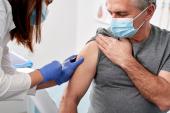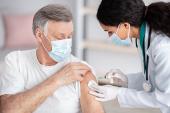After COVID-19, Unvaccinated at Risk for Long-term CVD Complications
Clinicians should stay watchful for MI, myocarditis, and HF even out to 1 year later in people who never got vaccinated.

Unvaccinated people who develop COVID-19 are at a significantly elevated risk of cardiovascular complications even up to 1 year after the infection when compared with unvaccinated men and women who don’t contract the virus, a new study shows.
At 12 months, unvaccinated COVID-19 survivors were at a heightened risk for a range of cardiovascular events, including stroke, arrhythmias, inflammatory heart disease, ischemic heart disease, heart failure, and thromboembolic events, and this excess risk was seen in both men and women.
The results indicate that “clinicians and [unvaccinated] patients with a history of COVID-19 should pay extra attention to their cardiovascular health in the long term,” lead investigator Weijie Wang, MD (Second Affiliated Hospital of Zhejiang Chinese Medical University, Hangzhou, China), told TCTMD in an email.
To date, a number of studies have shown that COVID-19 survivors have a higher risk of cardiovascular events in the short term. Longer-term data from US patients with COVID-19 included in the Veterans Affairs (VA) databases have also shown that the risk and burden of cardiovascular disease is increased both in those who were hospitalized as well as in those who were not. Wang noted that while there is evidence of long-term cardiovascular complications in COVID-19 survivors, the VA study is difficult to extrapolate to the general population given some of the database’s limitations. For example, it was largely comprised of white, male patients.
“Unfortunately, we’ve seen this previously,” said Thomas Maddox, MD, MSc (Washington School of Medicine in St. Louis, MO), past chair of the American College of Cardiology Science and Quality Committee, who commented on the results for TCTMD. “There probably is some sort of relationship between the virus itself and some effects on the cardiovascular system, whether that is coronary disease, atrial fibrillation, myocarditis, or some of the other things we’ve seen play out. It can affect the cardiovascular system in a variety of ways. That’s a concern and one thing this study continues to underline.”
Longer-Term Data
This latest study was published this week in eClinical Medicine, one of the Lancet family of journals, and included racially diverse patients from 48 healthcare organizations (HCOs) in the TriNetX Research Network, which includes information on demographics, diagnoses, procedures, medications, laboratory tests, and healthcare utilization. The researchers identified 690,892 unvaccinated people aged 20 years and older with two or more HCO visits and propensity-matched them to the same number of healthy controls who tested negative for SARS-CoV-2 and did not show any symptoms of COVID-19.
Compared with controls, those with COVID-19 had higher risks of MACE (HR 1.87; 95% CI 1.82-1.93) and any cardiovascular complication (HR 1.56; 95% CI 1.53-1.58) at 1 year. Additionally, they had a significantly higher risk of a range of cardiovascular outcomes compared with controls:
- Cerebrovascular complications: stroke (HR 1.61; 95% CI 1.55-1.69) and TIA (HR 1.50; 95% CI 1.35-1.67)
- Arrhythmias: atrial fibrillation/flutter (HR 2.41; 95% CI 2.30-2.52), tachycardia (HR 1.68; 95% CI 1.63-1.74), bradycardia (HR 1.60; 95% CI 1.52-1.68), and ventricular arrhythmias (HR 1.60; 95% CI 1.54-1.67)
- Inflammatory heart disease: myocarditis (HR 4.41; 95% CI 2.89-6.72) and pericarditis (HR 1.62; 95% CI 1.45-1.81)
- Ischemic heart disease: ACS (HR 2.05; 95% CI 1.75-2.39), MI (HR 1.98; 1.83-2.14), ischemic cardiomyopathy (HR 2.81; 95% CI 2.48-3.19), and angina (1.71; 95% CI 1.55-1.89)
- Cardiac disorders: Heart failure (HR 2.30; 95% CI 2.20-2.40), cardiomyopathy (HR 2.41; 95% CI 2.23-2.61), cardiac arrest (HR 1.75; 95% CI 1.53-2.01), cardiogenic shock (HR 1.99; 95% CI 1.60-2.47)
- Thrombosis: pulmonary embolism (HR 2.65; 95% CI 2.44-2.87) and deep vein thrombosis (HR 1.88; 95% CI 1.75-2.02)
In addition to the higher risk of incident CVD at 1 year, the probability of survival across all of the CVD conditions was significantly lower among patients who’d had COVID-19 than in those who weren’t infected with SARS-CoV-2.
As the researchers point out, COVID-19 appears to induce a hypercoagulable state, which in turn can increase the risk of thromboembolic events. COVID-19 can also trigger the cytokine cascade, which includes the release of proinflammatory cytokines and chemokines that can damage the cardiovascular system. Electrolyte imbalances can also lead to various tachyarrhythmias, according to Wang and colleagues.
If you are at risk for cardiac disease, or have any cardiac disease, it behooves you to do everything you can, to take advantage of all the tools we have now, to avoid contracting the disease. Thomas Maddox
Maddox emphasized that people with or at high risk for cardiac disease are much more likely to develop COVID-19, because these people are less healthy overall and because their immune systems are less capable of fighting off the virus. “If you are at risk for cardiac disease, or have any cardiac disease, it behooves you to do everything you can, to take advantage of all the tools we have now, to avoid contracting the disease,” he said.
In terms of the study, Maddox suggested there is the potential for confounding, as hinted by the finding that COVID-19 patients were at risk for all types of CVD. There is relatively good science to explain the relationship between COVID-19 and myocarditis and MI, but less so for other clinical endpoints, he said. If COVID-19 survivors had a higher risk for all cardiovascular outcomes, “we might actually just be selecting for people with poor cardiovascular health, but it’s hard to tease that apart in all the studies.”
Even conservatively accounting for potential confounding, Maddox said there is an element of cardiovascular risk with COVID-19 and contracting SARS-CoV-2 should be avoided however possible.
Vaccination, Maddox stressed, reduces the likelihood of developing clinically significant COVID-19. Yet even in the case where these people catch the virus, it is inevitably a milder disease course than if patients weren’t vaccinated. In and outside the clinic, he encourages those with or at higher risk for cardiovascular disease to be fully vaccinated, to be thoughtful about transmission rates in the community, and to consider the quality of their connection with the healthcare system, in case they need to be treated.
Michael O’Riordan is the Managing Editor for TCTMD. He completed his undergraduate degrees at Queen’s University in Kingston, ON, and…
Read Full BioSources
Wang W, Wang C-Y, Wang S-I, Wei C-C. Long-term cardiovascular outcomes in COVID-19 survivors among nonvaccinated population: a retrospective cohort study from the TriNetX US collaborative networks. Lancet. 2022;Epub ahead of print.
Disclosures
- Wang and Maddox report no conflicts of interest.





Comments